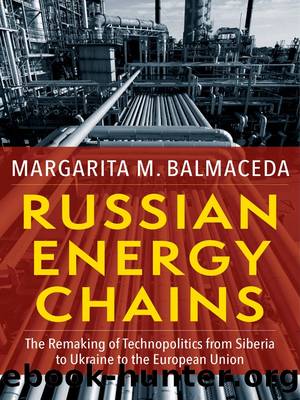Russian Energy Chains: The Remaking of Technopolitics from Siberia to Ukraine to the European Union by Margarita M. Balmaceda

Author:Margarita M. Balmaceda
Language: eng
Format: azw3
Tags: Ukraine, Non-Fiction, Economics, Political Science, Economic Policy, Politics, Russia, Soviet Union
ISBN: 9780231552196
Publisher: Columbia University Press
Published: 2021-05-11T01:00:00+00:00
RETHINKING ENERGY AND POWER
How has an examination of the three value chains affected the way we conceptualize energy and power? What have we learned about energy and power, both domestic and external?
Domestic Power: Value Chains and Post-Soviet Political Development
What have we learned about the impact of participation in Russian energy chains on the political development of post-Soviet states in their first twenty-five years of post-Soviet political life? In the traditional conception of power most often used in analyses of energy and international politics, power is influence, or âpower over.â This bookâs case studies, however, have shown that energy materiality (including energy-type specific ways of producing and processing it) can also bestow power to specific social, economic, and political actors by affecting âwhat capacities and practicesâ they would be âsocially empowered to undertakeââand, more basically, their very emergence as significant actors.12 We saw this, for example, in the case of coal actors in Donetsk, whose emergence as key players at the national Ukrainian level took place through the (prospect of) accessing (and sharing) profits through and throughout materiality-constrained value chains.
Although the immediate story and direct comparison presented in this book are about differences between fossil fuels, there is also a meta-story involved. This meta-story, in an ultimate analysis even more powerful than the immediate story told here, is the meta-story of what dependence on, and participation in, the value chains of (Russian) fossil fuels did to the societies and political systems of the former USSR. The examples provided in the case study chapters give us a sense of how entrenched was the connection between the supply of certain energy resources, the actors involved in these supplies, and certain types of political relations, both within each of these societies and across borders. The intermingling between dependency on networked types of fossil fuel energy and the political expectation that this energy and energy services be provided at affordable prices was a key factor in making energy policy decisions that came to have a deep impact on post-Soviet political systemsâon both Russia and the other post-Soviet states. The yellow vest protests in France in 2018â19 tell us that this phenomenon is not unique to the countries of the former Soviet Union.
What participation in these value chains meant for the political systems and the remaking of social relations in the first quarter century after the dissolution of the USSR is best understood if we look at the kinds of actors such systems helped constitute, empower, and bring closer to power.13 Actors able to use the opportunities presented by the loopholes of the transition periodâincluding in relations with Russia as the main energy supplierâand to reestablish value and supply chains sent into disarray by the Soviet dissolution were able to increase their own wealth and power and to use this to establish formal control over production chains at first controlled informally. The various âusesâ of energy (systems) above and beyond its direct use helped these actors constitute and strengthen their political power.
Domestically, we saw how the
Download
This site does not store any files on its server. We only index and link to content provided by other sites. Please contact the content providers to delete copyright contents if any and email us, we'll remove relevant links or contents immediately.
The Secret History by Donna Tartt(19088)
The Social Justice Warrior Handbook by Lisa De Pasquale(12190)
Thirteen Reasons Why by Jay Asher(8909)
This Is How You Lose Her by Junot Diaz(6886)
Weapons of Math Destruction by Cathy O'Neil(6279)
Zero to One by Peter Thiel(5802)
Beartown by Fredrik Backman(5754)
The Myth of the Strong Leader by Archie Brown(5507)
The Fire Next Time by James Baldwin(5444)
How Democracies Die by Steven Levitsky & Daniel Ziblatt(5218)
Promise Me, Dad by Joe Biden(5153)
Stone's Rules by Roger Stone(5088)
A Higher Loyalty: Truth, Lies, and Leadership by James Comey(4963)
100 Deadly Skills by Clint Emerson(4925)
Rise and Kill First by Ronen Bergman(4788)
Secrecy World by Jake Bernstein(4753)
The David Icke Guide to the Global Conspiracy (and how to end it) by David Icke(4718)
The Farm by Tom Rob Smith(4509)
The Doomsday Machine by Daniel Ellsberg(4490)
